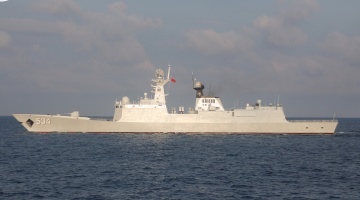By Ye Qiang
Since February 2021, the US Navy has dispatched the destroyer John S. McCain and the guided-missile destroyer USS Russell to conduct so-called “freedom of navigation operations”(FONOPs) in the South China Sea twice in succession. In addition, the USS Theodore Roosevelt Carrier Strike Group and the USS Nimitz Carrier Strike Group, also carried out joint drills in the disputed waters of the South China Sea onFebruary 9, marking the second time the US military had operated in this area since July 2020.
It can be deduced from these actions at least that the Biden administration newly taking office has not brought a fundamental change to the game in the South China Sea. There is a general belief inthe academic circle that the focus ofthe Biden administration’s “maximum pressure” policy on China over the South China Sea will shift from suppression by military and diplomacy to containment byrules and legal principles.
Driven by this policy, the US, under the banner of “rules-based international order”, is sure to offer more legal support to the other claimants to the South China Sea except China, to promote joint operations with its allies and partners. It will use and create more internationallaw issues, including the so-called “South China Sea Arbitration”, to challenge the legal basis of China’s rights and interests in the South China Sea and exert influence on the negotiation of the “Code of Conduct in the South China Sea” (COC). In addition, the US military is bound to strengthen its activities and expand its presence in the South China Sea and surrounding areas as usual and continue to regularly take the so-called FONOPs to interfere with the interpretation and application of international law.
This policy can be evidenced by the US military statement,in which the US has assigned itself the role of the “defender” of international law, and slandered China as a “threat” to the freedoms of navigation in and overflight over the South China Sea. Besides, the US statement has also violated the one-China principle by deliberately placing Taiwan region and Vietnam side by side as sovereign states.
Obviously, on the one hand, the US requires other countries to abide by international law. Still, on the other hand, it habitually regards itself as an exception to the constraints of international law, especially in the law of the sea.
It is a well-known fact that the US is one of the very few countries in the current international community that has not yet joined the “United Nations Convention on the Law of the Sea”(UNCLOS). However, it frequently wields the big stick of the convention to criticize other countries’ maritime policies and regional maritime affairs. The so-called FONOP proposed by the US has nothing to do with the freedom of navigation on the high seas as depicted in the convention.
Under the guise of freedom of navigation on the high seas (that is, on the high seas, vessels of all flags enjoy unrestricted freedom of navigation as one of the freedoms of the high seas), the US has run wild across the waters under the jurisdiction of other countries, aiming to influence or subvert the consensus reached by the international community on the interpretation of relevant provisions in the UNCLOS.
In 1979, the Carter administration initiated the Freedom of Navigation Program to show that the US would not accept the maritime claims of the countries involved in the convention. According to reports issued by the US Department of Defense from 1991 to 2018, the US FONOPs under the Freedom of Navigation Program challenged 654 “excessive” maritime claims by 61 countries and regions.
The US is a country that relentlessly refuses to acknowledge the UNCLOS constraints but has deliberately resorted to political and military provocative actions to interfere in affairs of maritime rights and interests concerning dozens of the convention signatories around the world over the past 30 years. This is typical of lawlessness and double standard.
The US side has claimed to accept the constraints of customary international law, but been indifferent to the international practices, constituent elements of the customary international law. Instead, it screened the customary law according to its interests and selectively imposed legal interpretations favorable to the US on the international community.
Freedom of navigation on the high seas is also a rule of the customary law. The establishment and evolution of customary law depend on universal international practices rather than a country’s preferences and actions of its interests. Quantities of international practices have evidenced that freedom of navigation as a rule of the customary law has been increasingly restricted by new international law principles and rules such as navigation safety, anti-terrorism, non-proliferation, marine environmental protection, maintenance of sustainable development, and proper consideration of the interests of developing countries, to meet the long-term interests of all humankind.
Among others, Article 87, Clause2 in the UNCLOS has been universally acknowledged as a balanced measure to the traditional principle of navigation freedom on the high seas. According to this clause, international practices since the 1990s have imposed more and more restrictions on the freedom of navigation.
For example, both South Africa and Portugal prohibited Japanese vessels carrying radioactive materials from entering their Exclusive Economic Zones (EEZs) in 1992; Brazil, Argentina, Chile, South Africa, Nauru and Kiribati explicitly prohibited British vessels carrying nuclear waste from entering the aforementioned EEZsin 1995; the European Union (EU) formally banned oil tankers carrying heavy oil from sailing into or calling at any member country’s ports in 2003.
In addition, the International Maritime Organization (IMO) has also redoubled its efforts in international legislation in recent years to continuously improve standards for the access of ships engaged on international voyages. The South China Sea is a semi-closed sea with a fragile ecological environment and a large population of coastal countries.
The repeated FONOPs by the US side in the South China Sea in a dangerous manner are sure to threaten the national defense security and national tranquility of coastal countries and damage the marine environment therein, as well as to destroy a peaceful and stable order in the South China Sea that regional countries are working to build. The US Navy seems like a modern pirate by interpreting the freedom of navigation unilaterally and ignoring its legal obligations and the sharedexpectations of the international community for maritime security.
The unscrupulous disregard of international law by the US will be harmful to properly manage differences in a constructive manner and promote the healthy and stable development of China-US relations. What’s worse, this will ultimately damage the common interests of the international community and the common well-being of humankind.
(The author is a scholar with National Institute for South China Sea Studies.)









